- Jacob Kirckman
- Hong Kong Ballet
- Aegean Anatolia
- La Scala di Seta
- Luigi Lablache
- Steve Reich: New York Counterpoint
- Davide Dato
- Anja Silja
 DISCUSSION: John Dante Prevedini leads a discussion about Classical Music and Politics, including contributions from Béla Hartmann and James Ross.
DISCUSSION: John Dante Prevedini leads a discussion about Classical Music and Politics, including contributions from Béla Hartmann and James Ross.
 UPDATES: There's a new feature every day at Classical Music Daily. Read about the various ways we can keep in touch with you about what's happening here.
UPDATES: There's a new feature every day at Classical Music Daily. Read about the various ways we can keep in touch with you about what's happening here.
A Supernatural Glow
GIUSEPPE PENNISI describes
the Fiery Angel that hangs over Rome
A new production of Sergei Prokofiev's L'Angelo di Fuoco (The Fiery Angel) had its debut in Rome on 23 May 2019. Teatro dell'Opera was full; I was in the audience. It is an opera seldom performed: a previous production in Rome was in 1966 in an Italian translation; I recall a concert performance in 1991 during a tour by the Mariinsky company and a fully staged performance at La Scala in 1999. One of the reason for the neglect is its emphasis on a single very difficult, and dramatically static role for the soprano. The libretto overwhelmingly centers on Renate, the possessed woman. Her hysterics dominate every scenes but two, making the role one of the longest and (in terms of range and volume) most demanding in opera history. Its vocal demands are extraordinary: Renate's part has been likened to that of Wagner's Isolde in difficulty. A love triangle underpins the plot as in many of the most l operas. In this one, the absence of the title character - the unseen third lover - dims the fire. Thus, L'Angelo di Fuoco never became a regular fixture on opera stages. Musicologist Richard Taruskin wrote that 'though its difficult staging career and its reputation as the composer's most modernistic work have lent L'Angelo di Fuoco the aura of a cause celèbre, familiarity has not always worked at its advantage'.
With no previous commissions or any actual production in sight, Prokofiev set out to write L'Angelo di Fuoco at one of the only times of his life in which religion was considered for his works. The thematic style is more like Prokofiev's pre-Revolution operas (such as The Gambler), even with the ambiguity. The only theme that strays from the ambiguous is the theme involved with the evil forces. The opera as a whole is a contrast to some of Prokofiev's earlier works (such as his opera The Love for Three Oranges) just by being a tragedy, and the story was considered very appropriate for Prokofiev's dark and sarcastic style. The production of the opera was one of the biggest hurdles. There was a large amount of extra material in the work, and negotiations with different theaters both in Europe and America continued to fail. In the midst of it all, Prokofiev felt unappreciated and unwanted, but his pride kept him striving for recognition. In 1926, Bruno Walter offered to have The Fiery Angel produced at a Berlin theater, which prompted Prokofiev to work on the orchestration. The orchestration was finished in 1927. Eventually, the opera's debut was in Venice, at La Fenice Opera House, in 1955, with Nino Sonzogno conducting and in an Italian translation, during the biennial contemporary music festival. It was a posthumous debut because Prokofiev had died two years earlier.
Then the opera was met with mixed reviews for different reasons. Some even called it a 'sixteenth-century Carmen with supernatural trimmings', amongst other mixed reviews. Largely, L'Angelo di Fuoco was seen as one of Prokofiev's '... strongest and most dramatically intense scores'. I consider it a startlingly modern work with occasional use of voices as mere texture, with some phrases repeated so often that the words begin to take on a purely rhythmic power. Certain utterances are given a halo of sound from an offstage chorus, lending them a supernatural glow.
The libretto is based on a novel by Valery Bryusov. Prokofiev was more intrigued by the 'orgies' - here, indulgences of passion - presented in the novel rather than the story ideas. The novel was inspired by Bryusov's own experiences with Nina Petrovskaya, and was considered one of the beginnings of the Russian Symbolist movement known as Vesy, or 'The Scales'. Nina was the mistress of Andrey Bely. In their time together, Nina also came to know Bryusov in 1904; this started to cause obvious concerns for Bely. There was an anticipated brawl on a remote road in Moscow, but a mutual friend of Bryusov and Bely prevented the fight. Nina, Andrey and Bryusov inspired Prokofiev's characters in his opera. The plot might seem a rather ordinary love and sex triangle, but it is entangled with so many elements and symbols, including the arrival of Faust and Mephistopheles in Act IV, that make it difficult to follow, even though the five acts and seven scenes only last some two hours. The plot is set in sixteenth century Rhineland.
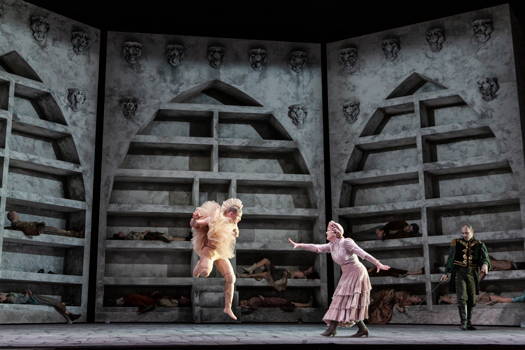
From left to right: Alis Bianca as Madiel, Ewa Vesin as Renate and Leigh Melrose as Ruprecht in Prokofiev's The Fiery Angel at Teatro dell'Opera di Roma. Photo © 2019 Yasuko Kageyama
In this Teatro dell'Opera production, the protagonist is the young Polish soprano Ewa Vesin. No doubt, she is one of the few sopranos able to cope with this taxing role. She is a 'pushed lyric soprano' with a good and well set voice as well as a wide extension of range. She fits the role well, and makes Renate's strikingly evocative obsession credible - her sexual relationship with the devil that she believes to be an angel, first, and a knight, later, her contagion to a whole group of nuns, and her trial and condemnation to be burnt at the stake. She marshaled an array of colors. She is warm and elegantly contoured whenever she reminisced about the angel. Her voice becomes shrill and cutting when her hysteria reached fever. She is also a superb actress.
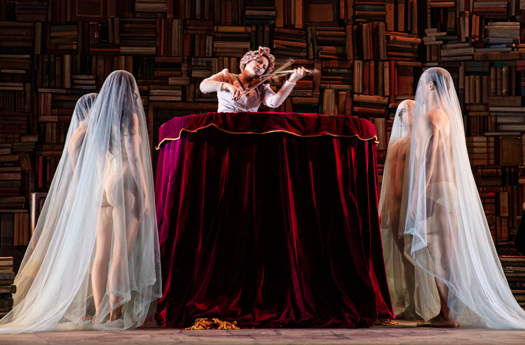
Ewa Vesin as Renate in Prokofiev's The Fiery Angel at Teatro dell'Opera di Roma. Photo © 2019 Yasuko Kageyama
Her Ruprecht - a good fellow who attempts to save her - is Leigh Melrose. His stamina, projection and dependable diction carried him through the demanding part, but his tonal variety was too poor as he went from love scene to nightmarish scene.
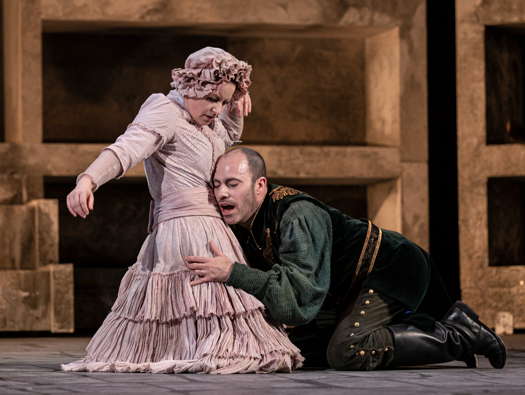
Ewa Vesin as Renate and Leigh Melrose as Ruprecht in Prokofiev's The Fiery Angel at Teatro dell'Opera di Roma. Photo © 2019 Yasuko Kageyama
The other singers do not have such difficult roles. It is worth mentioning Anna Victorova as the Hostess, Petr Sokoloc as Mathias, Mairam Sokolova as both the Sorceress and the Mother Superior, Serghey Radchenko as Agrippa, and Maxim Paster as Mephistopheles, but especially the young professionals in various roles - Domingo Pellicola, Murat Can Govem, Andrii Ganchuk, Timofei Baranov and Goram Jurič - from Progetto Fabbrica, Teatro dell'Opera's finishing school.
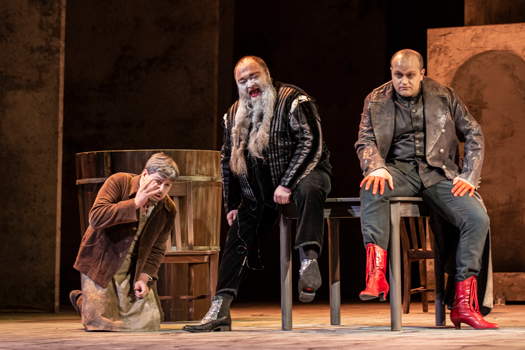
From left to right: Timofei Baranov as the Inn Keeper, Maxim Paster as Mefistofeles and Andrii Ganchuck as Johann Faust in Prokofiev's The Fiery Angel at Teatro dell'Opera di Roma. Photo © 2019 Yasuko Kageyama
The chorus, led by Roberto Gabbiani, was, as always, excellent; in the final scene, its polyphony captures the entire theatre and enthralls the audience.
In the Rome production, the stage direction was by Emma Dante, the sets were by Carmine Maringola, the costumes by Vanessa Sannino and the lighting was by Cristian Zucaro. Emma Dante and her colleagues set the action in a single set and with simple props show the various places where the action evolves. The basic set is a grey tryptic, while most costumes are of glittering colors. For the hallucinations, Ms Dante makes great use of the mimes of the theatre company she founded and directs in Palermo - the compagnia Sud Costa Occidentale. This gives great rhythm in a plot that is otherwise quite static.
The musical direction is entrusted to Alejo Pérez. He is a versatile conductor and often delves into twentieth century opera. In Rome, he conducted Berg's Lulu and Shostakovich's Il Naso (The Nose) in the recent past, and the orchestra works with him very well. He and the excellent orchestra of the Teatro dell'Opera rendered the complex score very well, especially the challenging task of providing a good balance between traditional elements and innovations such the symphonic, anti-conventional and almost anti-lyrical approach.
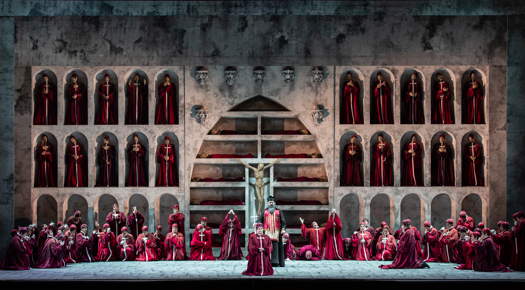
A scene from Prokofiev's The Fiery Angel at Teatro dell'Opera di Roma. Photo © 2019 Yasuko Kageyama
The production will most likely compete for the Premio Abbiati, Italy's most sought-after musical award. The audience was enthralled and applauded warmly at the curtain calls.
Copyright © 25 May 2019
Giuseppe Pennisi,
Rome, Italy



